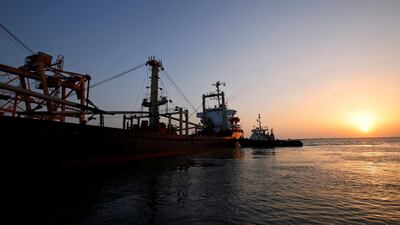As Yemen’s pro-government forces make their way into the coastal city of Hodeidah, liberating 78 kilometres of territory from Houthi control and standing within striking distance of the airport and seaport, the significance of the battle cannot be overstated.
The Red Sea port city and the fourth-largest Yemeni city is the Houthis’ main lifeline in the north, but also a ticking humanitarian bomb for more than 2.5 million residents.
For over a year, the Trump administration has balanced its approach between increasing logistical support for the Saudi-led coalition in Yemen and cautioning against intensifying the humanitarian crisis. Avoiding civilian casualties and prolonged fighting in Hodeidah, while trying to promote a political solution to the conflict, define Washington’s priorities.
A US State Department official, writing in an email to The National about the situation in Hodeidah, recalled Deputy Secretary John Sullivan's statement last week that "no party should obstruct the delivery of food, fuel and assistance to any part of Yemen". The National has learnt that a US State Department delegation arrived in Saudi Arabia last weekend to discuss political efforts in Yemen.
“The Hodeidah battle is extremely important to both sides in the war, as it is north Yemen's key lifeline,” said John Arterbury, a Yemen analyst at the Navanti Group, an analysis company in Washington.
The city hosts the second-largest port in the country after Aden. It has been under Houthi control since 2015. Since then, it has allowed the Houthis “to both profit off of resold [humanitarian] aid and provide food to the population it governs”, Mr Arterbury said.
For the Arab coalition, "taking Hodeidah could mean replacing the Houthis as the top guarantor of Yemen's food supply", he said. But he cautioned that "serious battles could disrupt food imports for a long period of time, or leave the port damaged or inoperable".
_____________
Read more:
Houthi retreat signalled by sale of vehicles
Hodeidah: the Houthi's supply hub
_____________
Such a scenario could be a nightmare for Washington, with Yemen “a few steps away from famine in some areas, and any significant upset in food deliveries could be the long-feared tipping point into calamity”, Mr Arterbury argued.
Several ideas are being debated to offset that nightmare scenario for Hodeidah’s population of about 400,000. One would be for the coalition to take the port while isolating the city.
“That could happen, but they have to secure a land route directly to the port,” Mr Arterbury said.
“I'm not sure it would be sustainable in the long run – the coalition's safest bet is to just go for the whole city, since the Houthis could still stage harassing attacks if they held the city and a route to it.”
The other option being discussed is a Houthi withdrawal that would spare the port and much of the city of infighting. “This is the coalition's best-case scenario, the Houthis have little popular support in Hodeidah, and any long-lasting defence would result in more human misery.” Mr Arterbury continued.
But the conclusion of this battle is unlikely to be that straightforward, according to observers.
"The Houthis will fight tooth and nail to keep the city and their control of the seaport," Nadwa Dawsari, a non-resident fellow at The Project for Middle East Democracy, told The National.
The Houthis have generated millions of dollars in revenues from controlling relief aid and other shipments coming through the port. So its loss would “deprive them of significant resources they relied on to fuel their war”, Ms Dawsari said.
In the long run, Ms. Dawsari urged the need “to have a post-battle plan to mitigate civilian harm, provide shelter, food and health services to the displaced population” from Hodeidah.
The US can help by putting pressure on the coalition to develop security and governance assistance for the battle’s aftermath.
Ultimately, all sides should seek to avoid the disruption or damage to the port, not only because of the economic consequences, but the human cost.
“Infighting in Hodeidah will have dire consequences on the humanitarian situation” if it disturbs the port activities, she warned.

